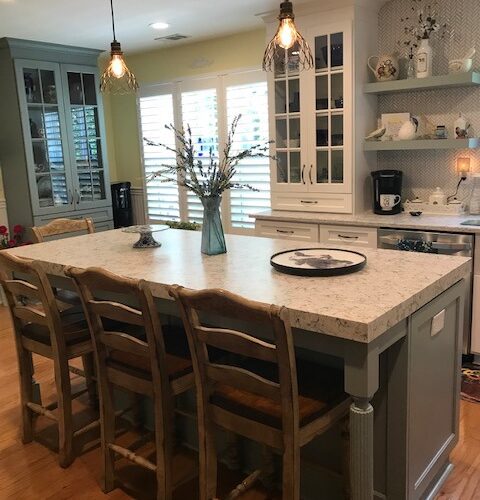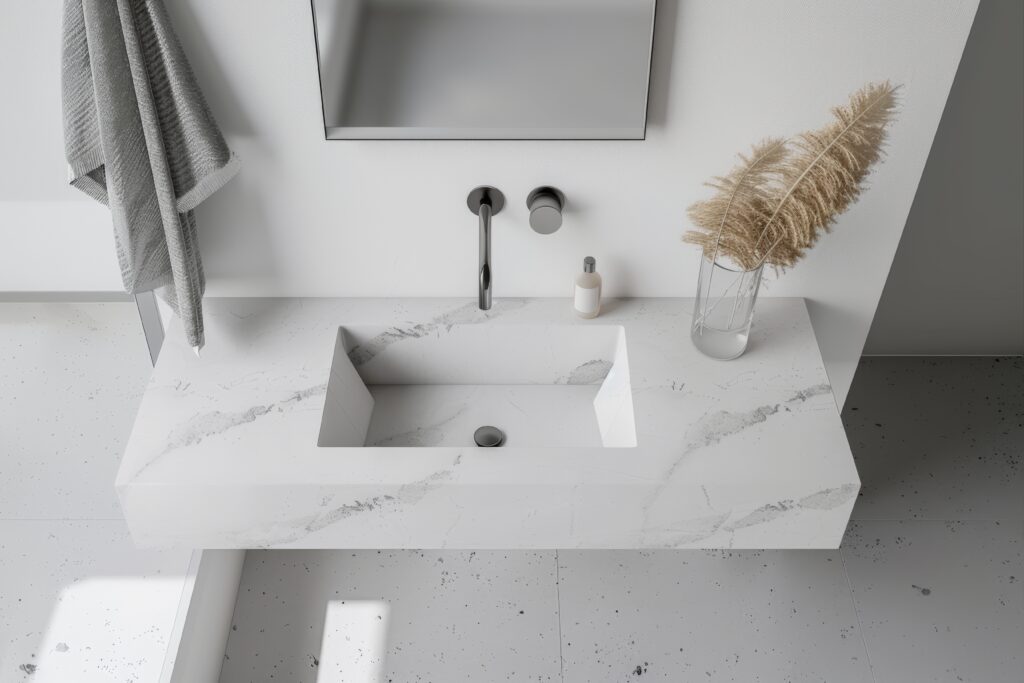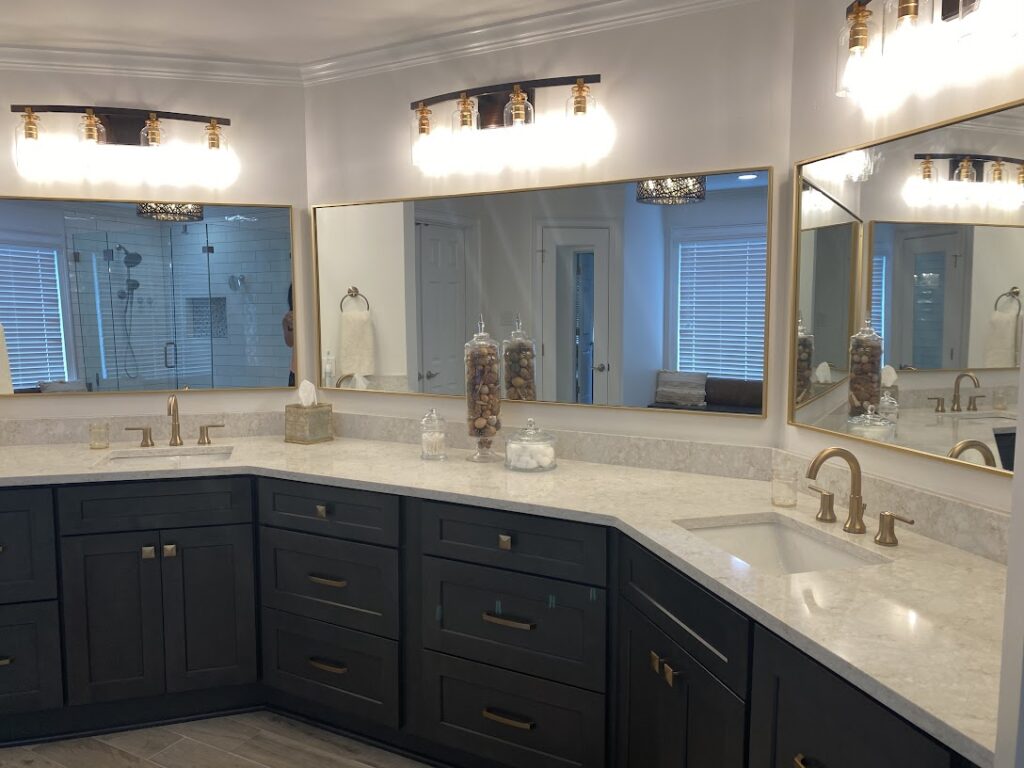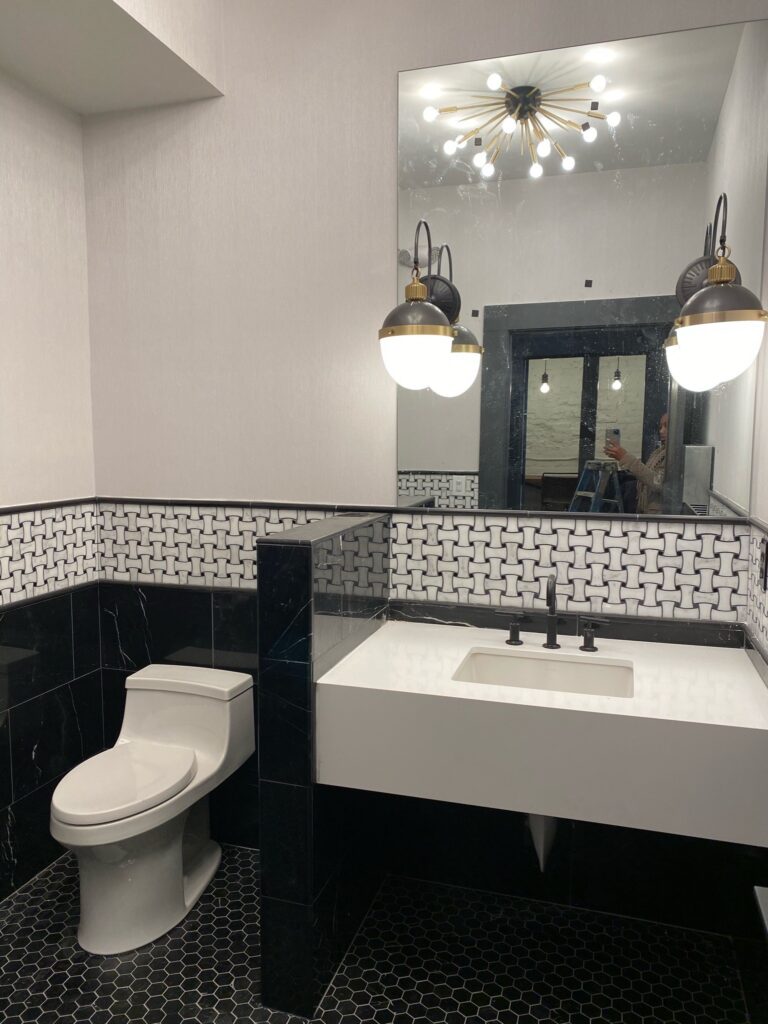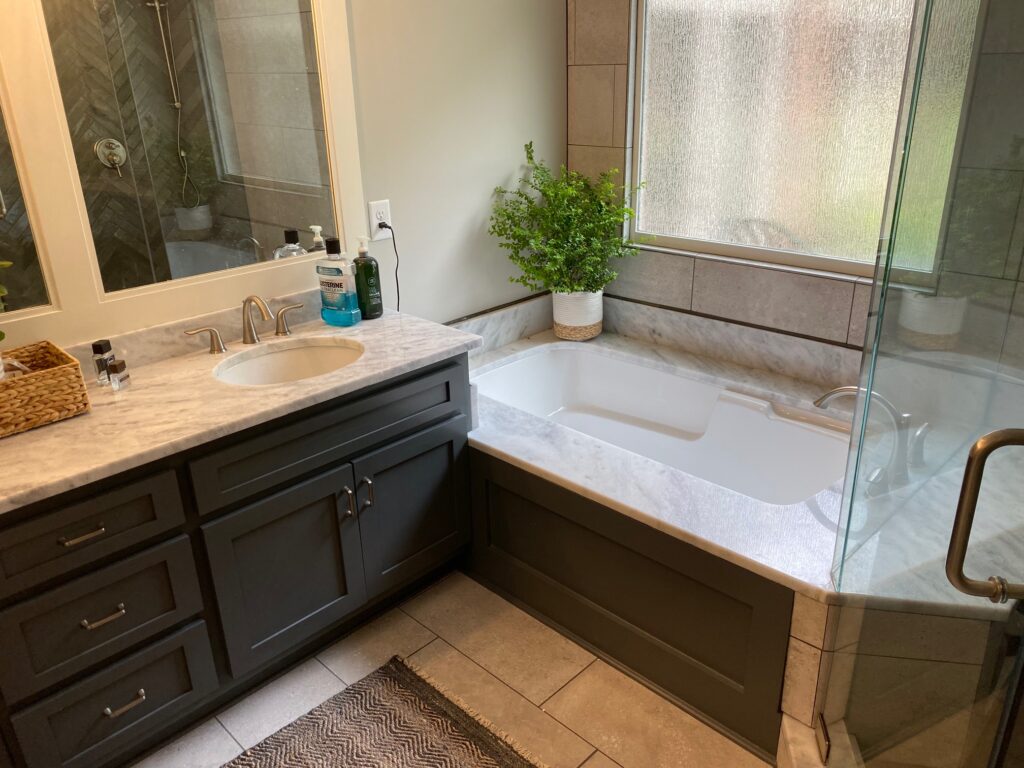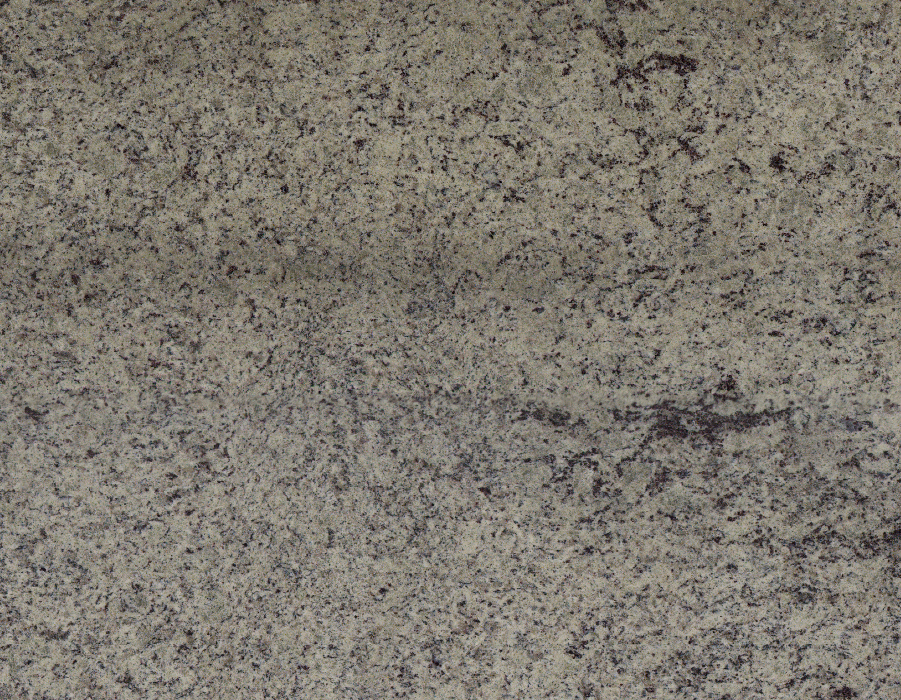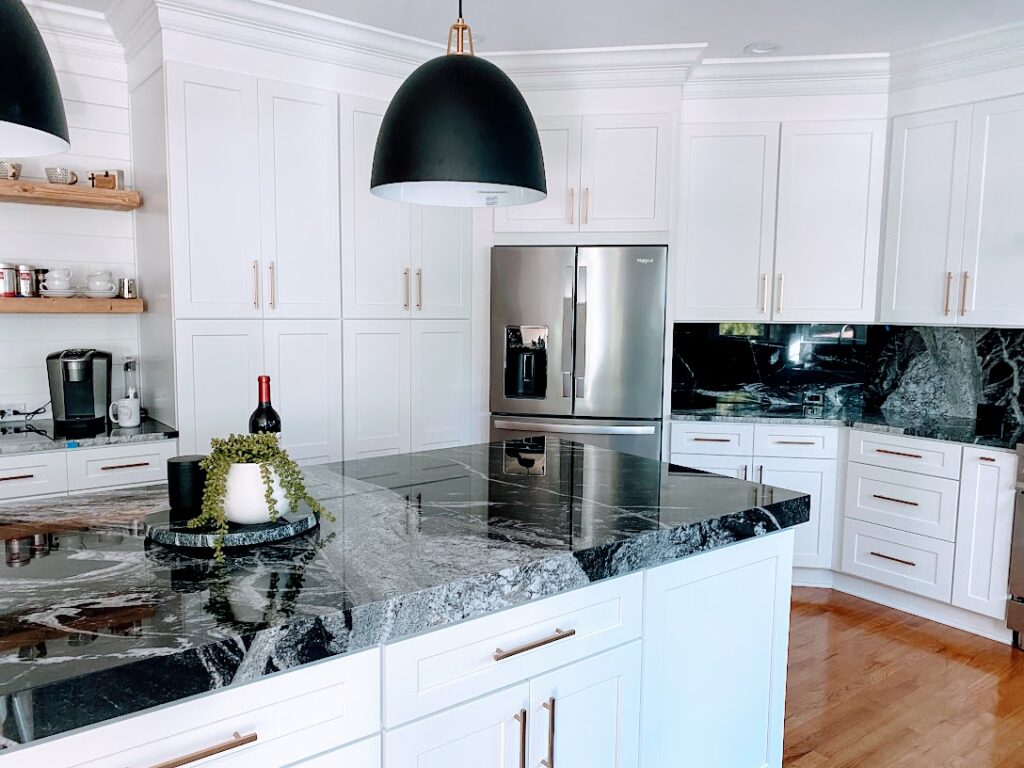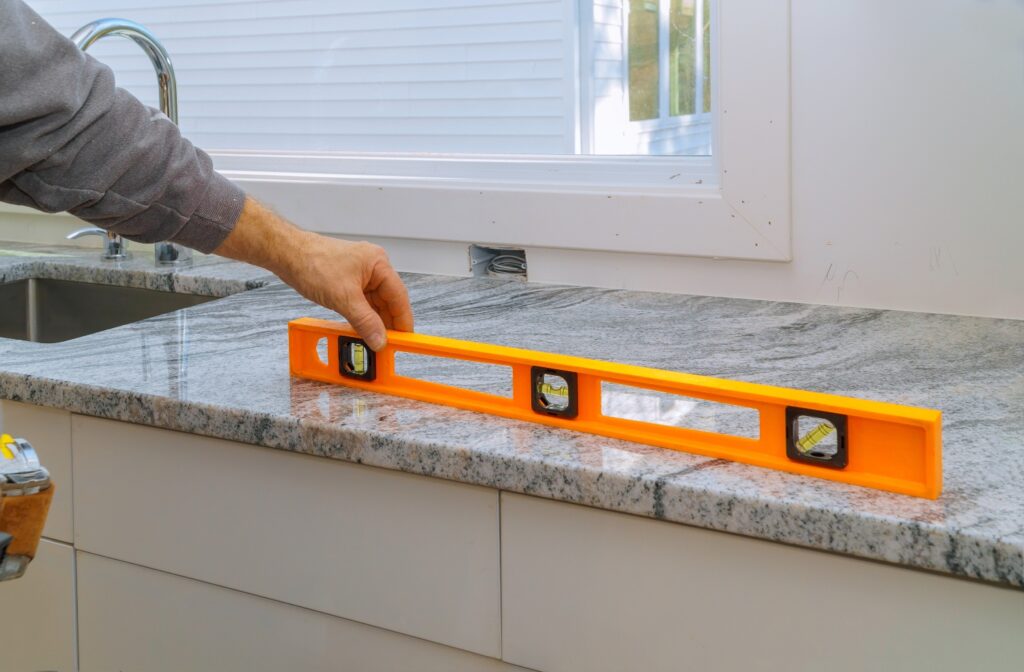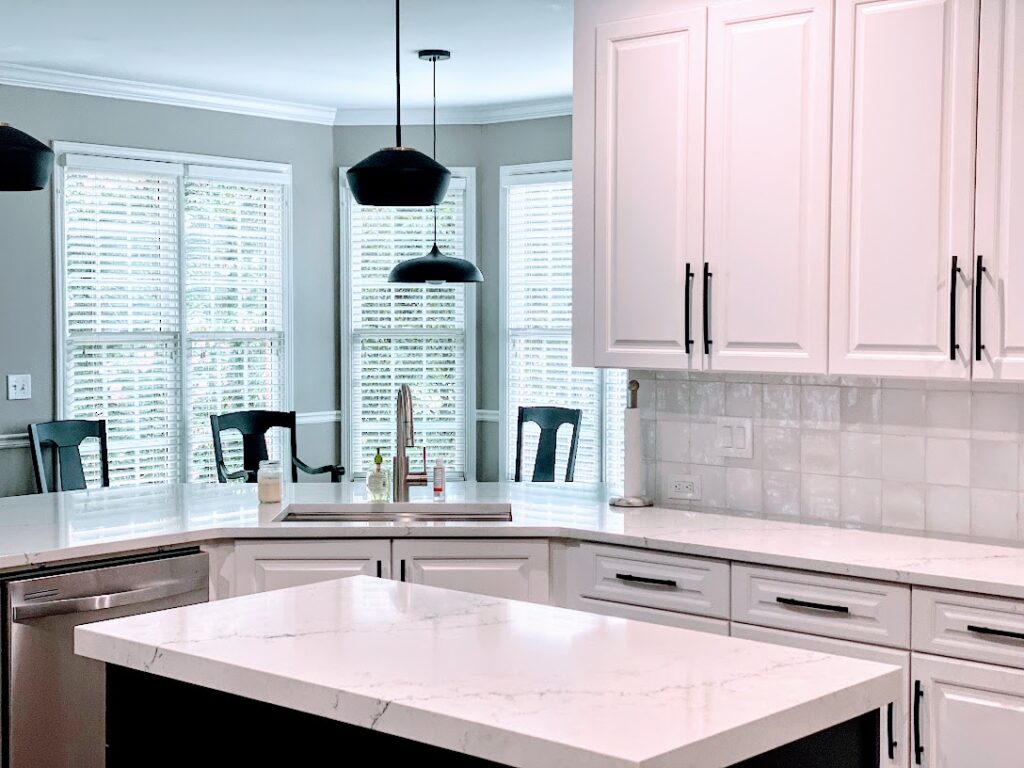Quartz Countertops vs. Stainless Steel Countertops
When you’re deciding between quartz and stainless steel countertops, you’ll encounter a fascinating blend of aesthetics and practicality. Quartz offers a non-porous surface with an impressive array of colors, perfect for those who value style diversity. On the other hand, stainless steel exudes an industrial charm, boasting excellent heat resistance but requiring a bit more upkeep to handle scratches. The choice isn’t just about looks; it’s about how each material fits into your lifestyle and kitchen needs. So, what should you prioritize in your kitchen’s heart? The answer isn’t as straightforward as it seems.
Material Composition and Characteristics
Understanding material composition and characteristics is crucial when buying countertops. Quartz and stainless steel are popular choices, each with distinct traits catering to different preferences and needs.
Quartz countertops are engineered from natural quartz crystals combined with resins and pigments. This process creates a durable, non-porous surface that resists stains, scratches, and bacteria. You’ll appreciate that quartz requires minimal maintenance—no sealing is necessary, and cleaning is a breeze with just soap and water.
The manufacturing process allows for a uniform look, ensuring consistency in appearance across the entire countertop. Plus, quartz is incredibly strong, making it a great option for high-traffic kitchens where durability is paramount.
On the other hand, stainless steel countertops are made from iron alloyed with chromium, providing a sleek, modern look that’s popular in professional kitchens. They’re heat-resistant, so you won’t need to worry about placing hot pots and pans directly on the surface.
Stainless steel is also non-porous, making it hygienic and easy to clean. However, it’s prone to scratches and dents, which can add character over time but may not appeal to everyone. If you’re after an industrial aesthetic and can embrace a bit of wear, stainless steel is a solid choice.
In choosing between quartz and stainless steel, consider how each material’s characteristics align with your lifestyle and kitchen demands. Both offer unique advantages, so think about what suits your cooking habits and maintenance preferences before making a decision.
Color and Design Options
Considering the functional aspects of quartz and stainless steel countertops, exploring their color and design options is equally important. When it comes to quartz, you’re offered many choices. Quartz countertops are engineered stone, allowing manufacturers to infuse them with various pigments and patterns. You can select from a vibrant palette, including whites, blacks, grays, and even bold colors like blues and greens.
Additionally, quartz can mimic the appearance of natural stones like marble or granite, providing a luxurious feel without the high maintenance.
In contrast, stainless steel countertops offer a more modern and industrial look. You won’t find the same variety of colors as with quartz, but stainless steel has its own unique charm. Its sleek, metallic finish creates a clean, contemporary aesthetic that fits well in minimalist and modern kitchens.
While color options are limited, you can still customize the finish. For example, you might choose a brushed or polished finish, each providing a distinct texture and sheen.
When deciding between the two, consider the overall style and atmosphere you want for your space. Quartz offers versatility and can easily fit into traditional or eclectic designs, thanks to its extensive color range.
On the other hand, stainless steel could be your ideal choice if you’re drawn to a sleek, professional kitchen vibe. Each material has its own flair, so think about what best aligns with your vision and existing decor.
Ultimately, your choice should reflect both your personal style and the ambiance you wish to create.
Durability and Maintenance
Quartz and stainless steel countertops consistently offer impressive durability, making them popular choices for kitchen surfaces. When deciding between these two, it’s essential to consider how each material holds up over time and what kind of maintenance it requires.
Quartz countertops are engineered stones made from natural quartz mixed with resin. This composition makes them incredibly hard and resistant to scratches. You won’t need to worry about sealing quartz, as it’s non-porous and doesn’t absorb liquids, simplifying your cleaning routine. A quick wipe with mild soap and water keeps it looking pristine.
However, be cautious with harsh chemicals or abrasive pads that can dull the surface.
Conversely, stainless steel countertops boast industrial strength, and they’re often used in professional kitchens for their robustness. They’re virtually indestructible with normal use, resisting chipping and cracking.
Stainless steel is also non-porous, so it won’t harbor bacteria, making it a hygienic option. Maintenance is straightforward; just use a soft cloth and mild detergent. Still, be mindful of fingerprints and smudges, which can show easily. A stainless steel cleaner or polish can help maintain its sleek appearance.
Both materials offer remarkable durability, but your choice might hinge on maintenance preferences. Quartz is a strong contender if you prefer a more traditional stone look with minimal upkeep. If you’re drawn to a modern, industrial style and don’t mind the occasional polishing, stainless steel is perfect for you.
Ultimately, both options stand up well to the rigors of daily kitchen life.
Heat and Stain Resistance
Considering heat and stain resistance is crucial when choosing between quartz and stainless steel countertops. You want a surface that can handle your kitchen’s daily demands without showing wear and tear over time. Each material has its strengths and weaknesses in this area.
Quartz countertops are engineered to be non-porous, which means they resist stains from everyday substances like wine, coffee, and oils. This makes them relatively low maintenance in terms of cleaning.
However, quartz isn’t invincible when it comes to heat resistance. If you place a hot pan directly on the surface, you risk causing thermal shock, which can lead to cracking or discoloration. Always use trivets or hot pads to protect your quartz countertop from heat damage.
On the other hand, stainless steel countertops boast excellent heat resistance. You can safely place hot cookware directly onto the surface without worrying about damage or discoloration. This feature makes stainless steel an attractive option for busy cooks who need a durable and practical workspace.
However, stainless steel is more prone to scratches and fingerprints, which might require more frequent cleaning to maintain its sleek appearance.
When it comes to stains, stainless steel resists most substances but can react with acidic materials if left for extended periods. Regular cleaning can prevent potential problems.
Ultimately, your choice will depend on balancing these factors against your kitchen habits and aesthetic preferences. If heat resistance is a top priority, stainless steel might be your best bet, but quartz could be the ideal choice if you prefer a stain-resistant surface.
Cost Considerations
When evaluating quartz and stainless steel countertops, how do their costs compare? Let’s break it down.
Quartz countertops typically have a higher upfront cost. This price depends on the quality of the quartz, the complexity of the installation, and any customizations you might want. Quartz offers a range of colors and patterns, which can influence the price. However, quartz’s durability and low maintenance might justify this initial expense.
On the other hand, stainless steel countertops are usually priced lower, including installation. The cost can vary based on the gauge of the steel, meaning the thickness, which affects durability and cost. Customization options like integrated sinks or backsplashes can also add to the expense.
While stainless steel might initially seem more affordable, remember that it can scratch and dent more easily, potentially leading to additional costs for repairs or maintenance over time.
Consider not only the initial cost but also the long-term investment. Quartz requires less upkeep and is more damage-resistant, saving you money on repairs.
While modern and sleek, stainless steel may need more frequent maintenance to keep it looking its best. Also, consider your home’s resale value. Both materials can add value, but depending on market trends, one might appeal more to potential buyers.
Evaluate these factors carefully to make a financially sound decision.
Environmental Impact
Regarding environmental impact, choosing between quartz and stainless steel countertops requires examining their production processes and sustainability closely.
Quartz countertops are engineered using a combination of natural quartz crystals and resins. While quartz is abundant, the mining process can disrupt ecosystems, and the production of resins involves chemicals that aren’t environmentally friendly. Additionally, transporting raw materials can contribute to carbon emissions. However, quartz countertops are durable and long-lasting, reducing the need for frequent replacements, which can offset some negative impacts.
Conversely, stainless steel countertops are made primarily from iron, chromium, nickel, and other metals. The extraction and refining of these metals can have significant environmental consequences, including habitat destruction and pollution.
However, stainless steel has a leg up when it comes to recyclability. It’s 100% recyclable and often contains a high percentage of recycled content. This means that choosing stainless steel can reduce the demand for virgin materials and lower overall environmental impact. Like quartz, stainless steel is highly durable, minimizing waste over time.
When considering the environmental impact, you need to weigh the pros and cons of both materials. Quartz offers longevity but involves challenging production processes, while stainless steel’s high recyclability is a significant advantage despite the environmental costs of metal extraction.
Ultimately, your choice will depend on which factors align more closely with your environmental values and priorities. By understanding these aspects, you can make a more informed decision that supports sustainability in your kitchen design.
Best Kitchen Styles for Each
Choosing the right countertop material can significantly influence your kitchen’s style and feel. If you’re leaning towards quartz, you’re likely aiming for a versatile and elegant aesthetic.
Quartz countertops fit seamlessly into contemporary, traditional, and transitional kitchen styles. Their wide range of colors and patterns can complement sleek, modern cabinetry or add warmth to a more classic setting. For a contemporary kitchen, pair white or grey quartz with high-gloss cabinets and minimalistic hardware.
In a traditional kitchen, opt for quartz with natural stone-like veining to enhance the classic charm, perhaps alongside wood cabinetry and vintage fixtures.
Conversely, stainless steel countertops bring a distinct industrial and modern vibe. They’re perfect if you’re going for a professional kitchen look or love a minimalist, urban aesthetic.
Stainless steel pairs well with open shelving, exposed brick, and concrete floors. It’s an ideal choice for a loft-style kitchen or a space that assimilates seamlessly with dining or living areas in an open-plan home.
For a modern kitchen, you might combine stainless steel with dark cabinets and bold accent colors for a striking effect.
Consider the atmosphere you want to create when deciding between quartz and stainless steel. Quartz offers warmth and adaptability across various styles, while stainless steel makes a bold statement and embodies a sleek, industrial feel.
Consider your kitchen’s design elements and how each material will enhance or transform the space’s overall look.
Frequently Asked Questions
What Are the Installation Requirements for Quartz and Stainless Steel Countertops?
To install countertops, ensure you’ve got precise measurements and a sturdy base. For quartz, use adhesive and sealant. Stainless steel requires a secure framework and welding. Always consult professionals to handle complex installations safely.
Can Quartz and Stainless Steel Countertops Be Customized for Unique Kitchen Layouts?
You can customize countertops to fit unique kitchen layouts. Both materials offer flexibility in design, so you can work with professionals to tailor them to your space. When planning, consider your kitchen’s style and functionality.
How Do Quartz and Stainless Steel Countertops Affect Home Resale Value?
When considering home resale value, countertops play a significant role. Upgrading them can boost appeal to potential buyers. Consider factors like durability, style, and maintenance, as these aspects greatly influence buyers’ decisions.
Are Quartz and Stainless Steel Countertops Suitable for Outdoor Kitchens?
You’re considering outdoor kitchen countertops, right? Stainless steel’s durability and weather resistance make it ideal. However, quartz isn’t recommended for outdoor use due to its UV sensitivity, which can lead to discoloration. So, stick with stainless steel.
Do Quartz and Stainless Steel Countertops Require Special Cleaning Products?
You don’t need special cleaning products for either. Use a gentle cleanser or mild soap for both, and avoid harsh chemicals. For stainless steel, a soft cloth prevents scratches. Regular maintenance keeps them looking great without extra effort.
Conclusion
Consider your kitchen style and maintenance preferences when choosing between quartz and stainless steel countertops. Quartz offers a versatile, stain-resistant surface with numerous color options, perfect for various aesthetics. Stainless steel delivers an industrial look with excellent heat resistance but requires more upkeep to avoid scratches and fingerprints. Weigh the cost, environmental impact, and durability of each material. Ultimately, your choice should align with your taste and the kitchen atmosphere you wish to create.

Val Carvalho is a manager at Atlanta Stone Creations, with nearly two decades of experience in the stone and design industry. In addition to her leadership role, Val plays a key part in sales and design, bringing creativity, precision, and a strong sense of style to every project. Known for her warm and collaborative approach, she builds strong relationships with both her team and her clients. Val is passionate about delivering beautiful, high-quality results and creating an exceptional experience from start to finish.

